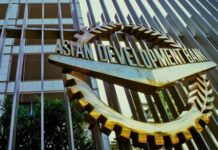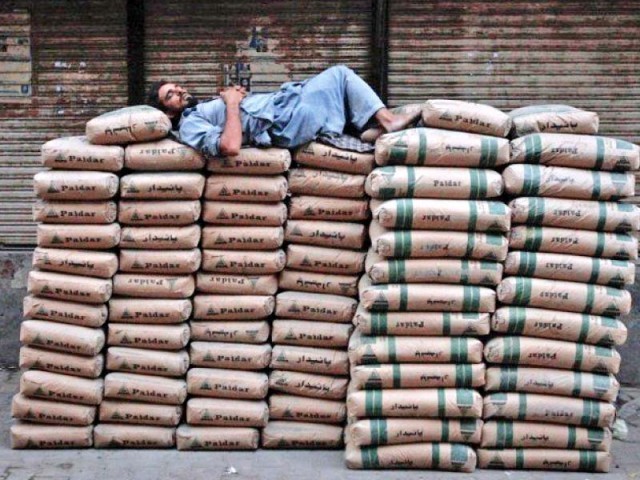LAHORE: The country’s cement manufacturers have warned that they are at a stage if the losses (3QFY20 losses) keep mounting, they fear large scale closures that would potentially lead to significant rise in prices.
According to figures of the Pakistan Bureau of Statistics (PBS), cement has the lowest annualised change (compounded annualised growth rate) of 2.2pc between 2008 to 2020, its per kg price (adjusted of retail taxes and duties) increased from Rs5.57 per kg to Rs7.20 per kg, which is the lowest as compared to other consumer good and commodities.
Talking to Pakistan Today, All Pakistan Cement Manufacturers Association (APCMA) Chairman Azam Faruque said that clearly there is a lot of noise about the hike in cement price. Whereas, according to the government’s own figures, it is one of the commodities with the lowest increase in the last 12 years.
Agreeing with Faruque, Waleed Tariq Saigol, a director at Maple Leaf Cement Factory Limited said that the charge of profiteering that is often made on cement companies is factually incorrect.
Saigol added that the average headline inflation in Pakistan over the last decade has been approximately 8pc, whereas cement price inflation has been roughly 2pc.
“This is lower than any other commodity, let alone those related to construction,” he said. The cement manufacturer added that this is a fact almost every cement company has suffered a loss in the previous quarter and some even cannot cover their manufacturing costs.
He said: “We are at a stage that if these losses keep mounting, we could see large scale closures and that would potentially lead to a significant rise in prices.” “We cannot have rising costs and taxes in excess of Rs170 per bag and expect this would not affect prices,” Saigol opined.
Meanwhile, Shankar Talreja, a senior analyst at Topline Securities Limited said that the cement sector during 3QFY20, turned in cumulative losses compared to cumulative profits in 3QFY19 and 2QFY20. He added that our analysis is based on 11 listed cement manufacturers out of 15, representing 95pc of the total sector market capitalisation.
Talreja opined that the deterioration in profitability during the quarter was mainly due to declining cement prices amidst competition over market share as industry production capacity has increased by over 50pc to 70 million tons over the past 2-3 years.
He added that the gross margins during the quarter further fell to 3.3pc, down by 21ppts YoY and 5.8ppts QoQ. The analyst added that this fall could be attributed to decline in retention prices in the range of 30-35pc for North based manufacturers during the outgoing quarter to an average of Rs250 per bag (Min: Rs237 per bag).
Talreja shared that during 9MFY20, gross margins clocked in at 6.6%, down 19ppts YoY as retention prices declined by 25pc YoY. He maintained that lower retention prices could be attributed to fierce competition in industry after a recent expansion cycle which has limited their ability to pass on rising costs emanating from currency devaluation, grid rates and increase in duties (FED).
Talreja added that as a result of lower prices, net sales for the sector declined by 16pc YoY during 3QFY20 in spite of an increase in total volumetric sales by 8.2pc YoY (North +12pc YoY, South -1.3pc YoY).
Commodity Prices Comparison
As per figures from PBS, during the period under review, the commodity prices of consumer goods including mutton increased from Rs251.80 per kg in 2008 to Rs919 in 2020, showing an annualised change of 11.4pc.
The per kg price of beef increased from Rs136.70 in 2008 to Rs445.64 in 2020, the price of tea increased from 324.14/kg in 2008 to Rs1,206.58/kg in 2020. During 2008 to 2020, the per kg price of sugar increased from Rs26.5 to Rs69.49, the per kg price of mash pulses increased from Rs74.70 to Rs251.82, the price of wheat increased from Rs23.90 to Rs43.86.
Meanwhile, during the period under review, the per kg price of rice increased from Rs51.60 to Rs82.66, the price of onions increased from Rs28.30/kg to Rs50.25/kg, the price of chicken increased from Rs105.60/kg to Rs138.79/kg and the price of fertilizers increased from Rs15.70/kg to Rs32.88/kg.
According to data, the per kg prices of beef, tea, sugar, Mash pulse, wheat, rice, onions, cooking oil, chicken and fertiliser witnessed an annualised change (compounded annualised growth rate) of 10.3pc, 11.6pc, 8.4pc, 10.7pc, 5.2pc, 4pc, 4.9pc, 5.4pc, 2.3pc and 6.4pc respectively.
The data revealed that between 2008 to 2020 the per ton price of steel bars increased from Rs62,000 to Rs100,000 showing an annualised change of 4.1pc. The PBS data stated that the per unit price of Toyota Corolla, Suzuki Mehran and Textiles (Lawn) increased with an annualised change of 8pc, 9.7pc and 10.7pc respectively.

























You have been misguided by Mr Telreja You can’t compare cement prices with food stuff Cement is Capital Goods & not consumer item Moreover there is no any justification to increase cement prices as they are receiving coal and furnace at very low cost. Simply they have created Cartel to manipulate local market and some stock brokers are defending them asl leading mambers of Stock Exchange are also cement factory owners It seems that another Scandel is underway Now where is Watchdog?
These so called illiterate people needs to think once again according to the government statistics 55 millions people are living below poverty line Pakistan and 32.31 million are house holds are already present out of 240 million and the lower class comprised of 32.8% and middle of 29.5 of the population, all the 240 million needs food and only the 37.7 of the upper class can afford the construction of homes at most than why the hell are you comparing eatable items with a luxury item it doesn’t makes sense.
3rd class economists of Pakistan because of people like you the country is suffering miserably
Have you heard !
Comparing An Apple with An Orange ?
This is what the article is about !
Fruit prices is gone up so cement shoul fallow up.
Steel is gone from 60 to 100 so cement should also go up?
Very poor report some one has wasted its time